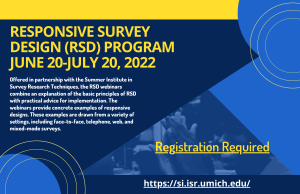Presented By: Summer Institute in Survey Research Techniques
Case Studies in Responsive Design Research in Web Surveys - Responsive Survey Design: A Research Education Program - Summer Institute in Survey Research Techniques
RSD webinar presented by Scott Crawford & Stephanie Coffey

Case Studies in Responsive Design Research in Web Surveys
Webinar open for registration!
June 30, 2022
9:00am-1:00pm
Th
Web surveys can be an inexpensive method for collecting data. This is especially true for designs that repeat measurement over several time periods. However, these relatively low-cost data collections may result in reduced data quality if the problem of nonresponse is ignored. This webinar will examine methods for using RSD to effectively deploy scarce resources in order to minimize the risk of nonresponse bias.
Recent experiences with the University of Michigan Campus Climate Survey (UM-CCS), the National Survey of College Graduates (NSCG), and the Residential Energy Consumption Survey (RECS) are used to illustrate this point. These surveys are all defined by phased designs and multiple modes of contact. This approach improves survey outcomes, including response rates, representativeness, and cost by using alternative contact methods in later phases to recruit sample members from subgroups that were less likely to respond in earlier phases. These surveys demonstrate the benefit of RSD in web surveys across a variety of different samples sizes, and both small and large budgets and management teams. As a result, lessons from these experiences can be directly applied in many similar settings.
Not for academic credit.
Instructors: Scott Crawford & Stephanie Coffey
All 2022 courses will be held in an alternative remote format.
Webinar open for registration!
June 30, 2022
9:00am-1:00pm
Th
Web surveys can be an inexpensive method for collecting data. This is especially true for designs that repeat measurement over several time periods. However, these relatively low-cost data collections may result in reduced data quality if the problem of nonresponse is ignored. This webinar will examine methods for using RSD to effectively deploy scarce resources in order to minimize the risk of nonresponse bias.
Recent experiences with the University of Michigan Campus Climate Survey (UM-CCS), the National Survey of College Graduates (NSCG), and the Residential Energy Consumption Survey (RECS) are used to illustrate this point. These surveys are all defined by phased designs and multiple modes of contact. This approach improves survey outcomes, including response rates, representativeness, and cost by using alternative contact methods in later phases to recruit sample members from subgroups that were less likely to respond in earlier phases. These surveys demonstrate the benefit of RSD in web surveys across a variety of different samples sizes, and both small and large budgets and management teams. As a result, lessons from these experiences can be directly applied in many similar settings.
Not for academic credit.
Instructors: Scott Crawford & Stephanie Coffey
All 2022 courses will be held in an alternative remote format.